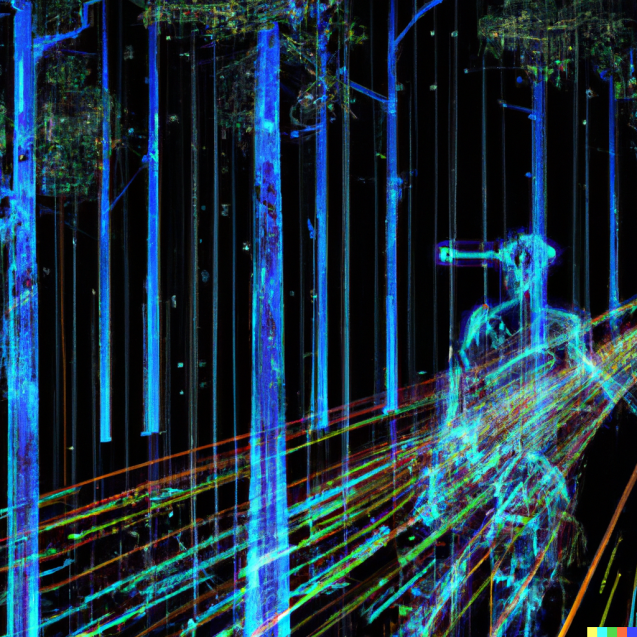How Ecology Could Inspire Better Artificial Intelligence, and Vice Versa
Two complex fields of human endeavor may have a lot to learn from each other.
Many of today’s artificial intelligence systems loosely mimic the human brain. In a new paper, researchers suggest that another branch of biology—ecology—could inspire a whole new generation of AI to be more powerful, resilient and socially responsible.
Just published in Proceedings of the National Academy of Sciences, the new paper argues for a synergy between AI and ecology that could both strengthen AI and help to solve complex global ecosystem challenges, such as disease outbreaks, loss of biodiversity and the impacts of climate change.
“The problems we are facing are so urgent, we are not developing theories at the speed we need to, to address them. AI can has the potential to help us jump from broad data to actual knowledge without going through all the usual steps,” said study coauthor Ajit Subramaniam, a biological oceanographer at Columbia University’s Lamont-Doherty Earth Observatory. Conversely, he said, “The really exciting thing is that AI not only helps us as scientists in different fields, but the principles of ecology can also help AI move forward.”

The idea arose from the authors’ observation that AI can be shockingly good at certain tasks, but still far from useful at others—and that AI development is hitting walls that ecological principles could help it overcome.
“The kinds of problems that we deal with regularly in ecology are not only challenges that AI could benefit from in terms of pure innovation; they’re also the kinds of problems where if AI could help, it could mean so much for the global good,” said Barbara Han, a disease ecologist at Cary Institute of Ecosystem Studies, who co-led the paper. “It could really benefit humankind.”
Ecologists, Han included, are already using artificial intelligence to search for patterns in large data sets and to make more accurate predictions, such as whether newly discovered viruses might be capable of infecting humans, and which animals are most likely to harbor those viruses. However, the new paper argues that there are many more possibilities for applying AI in ecology, such as in synthesizing big data and finding missing links in complex systems.
Scientists typically try to understand the world by comparing two variables at a time. For example, how does population density affect the number of cases of an infectious disease? The problem is that, like most complex ecological systems, predicting disease transmission depends on many variables. Ecologists don’t always know what all of those variables are; they are also often limited to physical ones that can be easily measured, as opposed to social and cultural factors.
“Compared to other statistical models, AI can incorporate greater amounts of data and a diversity of data sources, and that might help us discover new interactions and drivers that we may not have thought were important,” said study coauthor Shannon LaDeau, a disease ecologist at the Cary Institute. In helping to uncover these complex relationships and emergent properties, artificial intelligence could generate unique hypotheses to test and open up new lines of research, she said.
Artificial intelligence systems are notoriously fragile, and when they go awry, there can be potentially devastating consequences, such as car crashes (already a reality with self-driving cars) or a misdiagnosis of cancer (if medicine becomes sufficiently dependent on AI).
The incredible resilience of ecological systems could inspire more robust and adaptable AI architectures, the authors argue. In particular, ecological knowledge could help to solve the problem of so-called “mode collapse” in artificial neural networks, the systems that power speech recognition, computer vision and other functions.
“Mode collapse is when you’re training an artificial neural network on something, and then you train it on something else, and it forgets the first thing that it was trained on,” explained Kush Varshney of IBM Research, who co-led the paper. “By better understanding why mode collapse does or doesn’t happen in natural systems, we may learn how to make it not happen in AI.”
Inspired by ecological systems, a more robust AI might include more flexible feedback loops, redundant pathways and decision-making frameworks. These upgrades could also contribute to a more so-called “general intelligence” for AI systems that could enable reasoning and connection-making beyond the specific data that the algorithm was trained on.
Ecology could also help reveal why AI-driven large language models, which power popular chatbots such as ChatGPT, show emergent behaviors that are not present in smaller language models. These behaviors include “hallucinations”—when an AI system generates false information. Because ecology examines complex systems at multiple levels and in holistic ways, it is good at capturing emergent properties such as these, and can help to reveal the mechanisms behind such behaviors, the authors say.
The paper was also coauthored by Kathleen Weathers of the Cary Institute and Jacob Zwart of the U.S. Geological Survey.
Adapted from a press release by the Cary Institute.
